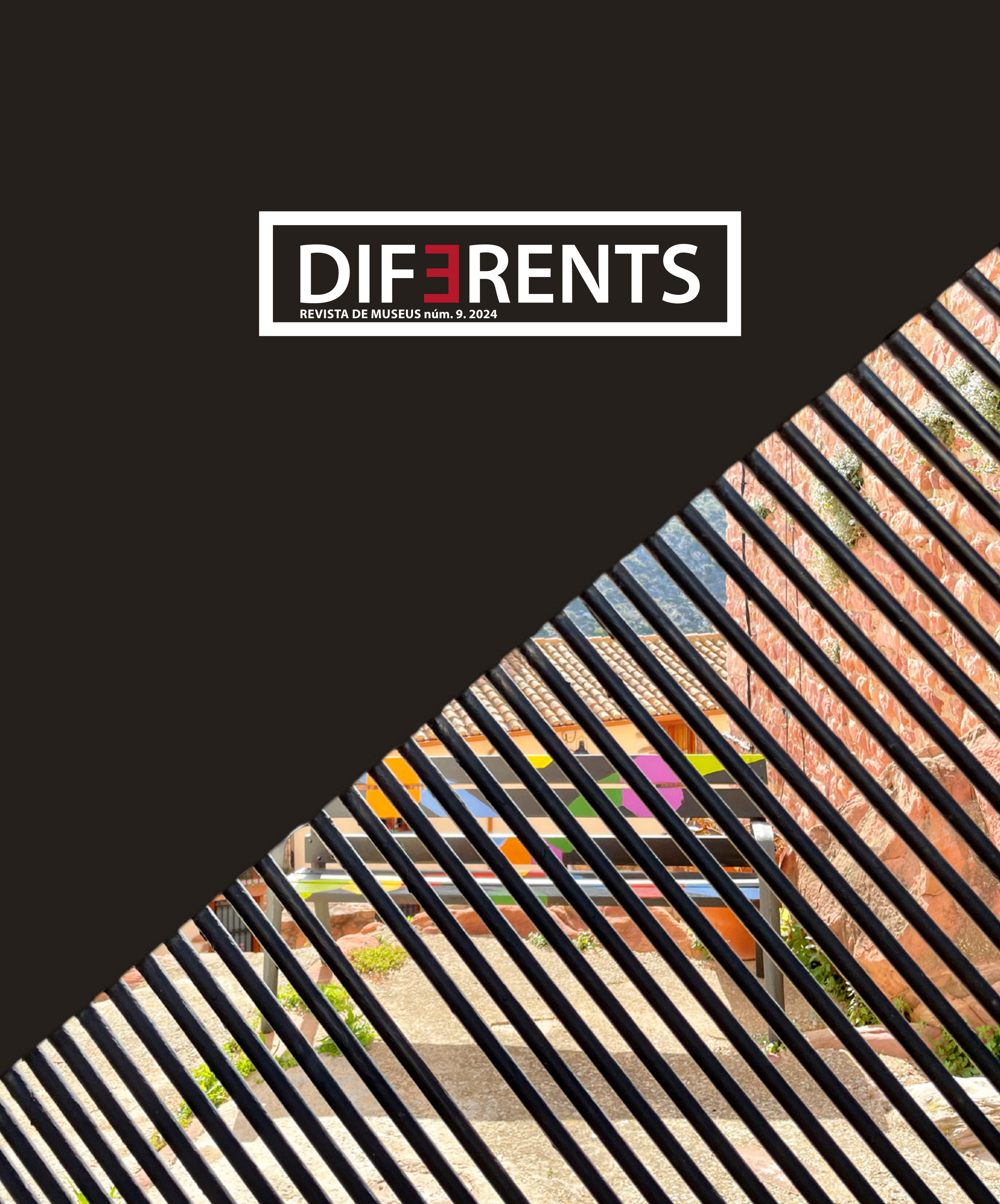Hibridació del Metavers als museus. La tecnologia d'interactivitat com a canal d'immersió en la cultura
##plugins.themes.bootstrap3.article.main##
Resum
El metavers (MV) és una mescla de realitat física i digital facilitada per tecnologies avançades, específicament de realitat virtual (RV) i realitat augmentada (RA). Les primeres experiències dutes a terme per Museus com el Louvre (França), el British Museum (el Regne Unit), el The Met (els Estats Units) o Bombes Gens (Espanya), estan posant de manifest les possibilitats que ofereix el MV per a millorar l'experiència del visitant, dinamitzar els seus continguts, flexibilitzar l'accés i preservar el seu patrimoni cultural. L'arribada de dispositius electrònics de RV, juntament amb els portals de MV En línia, amplia les vies de divulgació i creació de continguts per a diferents àmbits, inclòs el de l'art. En aquest article es donen a conèixer les eines tecnològiques més avançades que, en aquest moment, s'estan posant al servei dels museus. El caràcter sostenible del MV es justifica amb la desaparició de les barreres físiques. La gestió de les col·leccions d'art ha deixat de tenir límits. En l'apartat metodològic es descriuen les tecnologies aplicades al projecte del Museu Virtual Igor Issacovitch, dirigit i comissariat per Mudit.org i realitzat per Rendersim. És necessari, per tant, conèixer la potencialitat d'aquestes tecnologies al servei de la cultura, ja que, de l'adequada hibridació d'aquesta Tecnologia dependrà el lideratge dels museus en l'era digital.
Descàrregues
##plugins.themes.bootstrap3.article.details##
Referències
Acevedo Nieto, Javier (2022) «Una introducción al metaverso: conceptualización y alcance de un universo online», ad Comunica, Revista Científica de Estrategias, Tendencias e Innovación en Comunicación, 24: 41-56. Disponible en https://www.e-revistes.uji.es/index.php/adcomunica/article/download/6544/7174/ [Fecha de consulta 15/05/2024]
Aparicio Gómez, Óscar; Ostos Ortiz, Olga y José Gabriel Mesa Angulo (2022) «La convergencia de aprendizajes en el metaverso», Revista Interamericana de Investigación, Educación y Pedagogía, 15 (2): 385-398. Disponible en https://doi.org/10.15332/25005421.7879 [Fecha de consulta 14/04/2024]
Ball, Matthew (2022) El metaverso y cómo lo revolucionará todo, Madrid: Editorial Deusto.
Crespo-Pereira, Verónica; Sánchez-Amboage, Eva y Matías Membiela-Pollán (2023) «Retos del metaverso: una revisión sistemática de la bibliografía desde las Ciencias Sociales, el Marketing y la Comunicación» Profesional de la información, 32 (1): e320102. Disponible en https://doi.org/10.3145/epi.2023.ene.02 [Fecha de consulta 20/5/2024]
Da Silva Costa, Condornet (2022) «El metaverso y los museos» Metaverso Audiovisual. Disponible en https://www.metaversoaudiovisual.com/elmetaverso-y-los-museos/ [Fecha de consulta 13/02/2024]
EVE Museos e Innovación. Disponible en https://evemuseografia.com/ [Fecha de consulta 12/02/2024]
Hutson, James y Piper Hutson (2023) «Museums and the Metaverse: Emerging Technologies to Promote Inclusivity and Engagement», en zupcán, Ladislav (ed.) (2023) Application of Modern Trends in Museums, 1-20. Editorial InTech Open. Disponible en http://dx.doi.org/10.5772/intechopen.110044 Fecha de consulta 4/04/2024]
Kim, Sangyun (2022). El metaverso. Un viaje hacia la tierra digital, Madrid: Editorial Anaya.
López-Belmonte, Jesús; Pozo-Sánchez, Santiago y Antonio-José Moreno-Guerrero (2023) «Metaverso en Educación: una revisión sistemática», Revista de educación a distancia, 23 (73). Disponible en https://doi.org/10.6018/red.511421 [Fecha de consulta 20/03/2024]
Martín Ramallal, Pablo; Sabater-Wasaldúa, Jesús y Mercedes Ruiz-Mondaza (2022) «Metaversos y mundos digitales, una alternativa a la transferencia del conocimiento: el caso OFFF-2020», Fonseca. Journal of Communication, 24: 87–107. Disponible en https://doi.org/10.14201/fjc.28287 [Fecha de consulta 24/03/2024]
Martín-Albo, Manuel (2021). «Las tecnologías que revolucionarán nuestra vida y que son una oportunidad de inversión», Bolsamanía. Disponible en bit.ly/4279XPA [Fecha de consulta 18/03/2024]
Martín-Blas, Edgar. (2022). Metaverso. Pioneros en un viaje más allá de la realidad, Madrid: lid Editorial.
Martínez Peláez, Agustí; Nuñez De Prado Clavell, Sara y Javier Rodríguez Abengózar (2023) «El Museo Virtual URJC, un patrimonio de la universidad en el metaverso como modelo de mediación entre artistas y coleccionistas», I Congreso de Arte y Contexto Social. Disponible en https://arteycontexto.org/ponencia/el-museovirtual-urjc-un-patrimonio-de-la-universidaden-el-metaverso-como-modelo-de-mediacionentre-artistas-y-coleccionistas/ [Fecha de consulta 2/03/2024]
Moheno Gatón, Alejandro (2022) «El metaverso en el proceso de enseñanza-aprendizaje: la interpretación de la torre del homenaje del castillo de Montilla», [Tesis de Doctorado, Universidad de Córdoba]. Repositorio de la Universidad de
Córdoba. Disponible en https://dialnet.unirioja.es/servlet/tesis?codigo=312669 [Fecha de consulta 20/03/2024]
Museo Bombas Gens. Centre d’Arts Digitals, València. https://bombasgens.com/es/bombasgens-centre-darts-digital/
Museo de Arte Metropolitano , MET (2023) Réplica. Verizon, The Met, Roblox, Unit9 y Ode to Joy. https://www.reasonwhy.es/actualidad/museo-metaplicacion-replica-roblox-experiencia-realidadaumentada).
Museo de Bellas Artes de Gran Canaria. Sala Metaverso Isla de Arte. https://salametaverso.grancanariaisladearte.com/
Museo Metaverso UPV. Campus Alcoi.
Ordóñez Valencia, Maylee Lisbeth et al. (2022) «Análisis de herramientas del metaverso y su impacto en contextos educativos», Sapienza: International Journal of Interdisciplinary Studies, 3 (2): 610–630. Disponible en https://journals.sapienzaeditorial.com/index.php/SIJIS/article/download/366/237 [Fecha de consulta 25/03/2024]
Ortega-Rodríguez, Javier (2022) «De la realidad extendida al metaverso: una reflexión crítica sobre las aportaciones a la educación», Teoría de la Educación. Revista interuniversitaria, 34 (2): 189-208. Disponible en https://doi.org/10.14201/teri.27864 [Fecha de consulta 5/02/2024]
Paredes Otero, Guillermo (2023) «El estudio del metaverso en tiempos de pandemia. Revisión de la literatura científica sobre la última frontera digital», Ámbitos. Revista Internacional de Comunicación, 61: 132-148. Disponible en https://doi.org/10.12795/Ambitos.2023.i61 [Fecha de consulta 10/05/2024]
Ramírez-Herrero, Virginia; Ortíz de Urbina Criado, Marta y José Amelio Medina-Merodio (2023) «La revolución del metaverso: análisis crítico de sus luces y sombras», Esic Market 54 (3): e334. Disponible en https://doi.org/10.7200/esicm.54.334 [Fecha de consulta 1/02/2024]
Sánchez, Juan Antonio (2022) Nuevas perspectivas en museología, Madrid: Editorial Universitaria.
Villaespesa, Elena y Vanesa Domínguez (eds.) (2015) El papel de la tecnología en el Museo, Madrid: Editorial Museo del Prado.
Web Spatial.io. https://www.spatial.io/s/EPSA-65bb43c-9c2bf193e01b263c8?share=0


